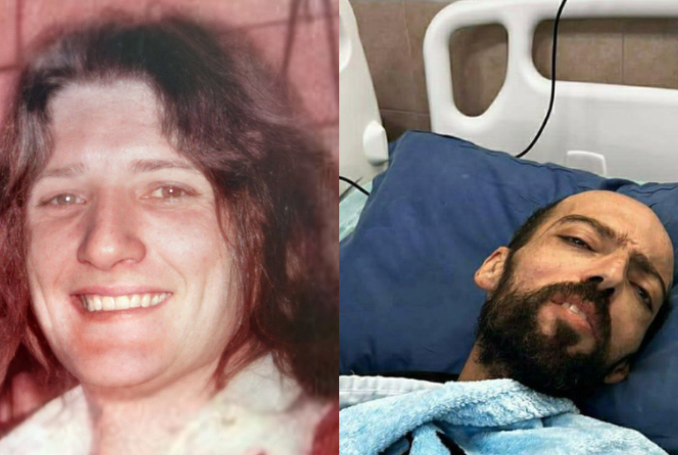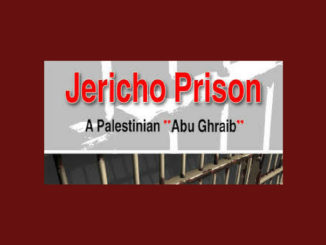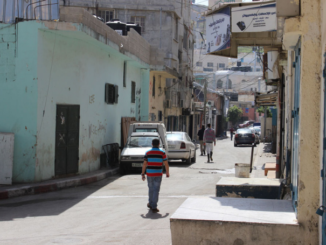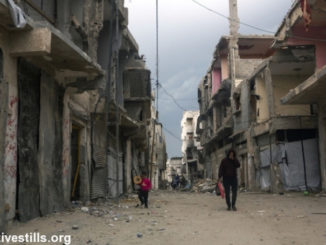
By Benay Blend
On Sunday, September 25, 2022, 30 Palestinian prisoners under Israeli “administrative detention” announced an open-ended hunger strike to #EndAdministrativeDetention. According to Samidoun: Palestinian Prisoner Solidarity Network, over 740 prisoners are currently jailed without benefit of trial or knowledge of evidence against them.
At a press conference outside the Ofer military prison, Palestinian prisoners’ institutions and family members of the hunger strikers, including the Palestinian Prisoners’ Society and Addameer Prisoner Support and Human Rights Association, read a message from the hunger strikers:
“Our demand is: clean air, a sky without bars, a space of freedom, and a family gathering around the table. The demand of the occupation is to separate us from our social reality and our national and humanitarian role and turn us into dry fragments. Between our demand and their demand, the occupying power carries out the abhorrent policy of administrative detention.
“We are the sons of the land, the heirs of Abu Ammar, al-Hakim, al-Yassin, al-Shiqaqi and al-Qassim, and the heirs of all the martyrs. Wherever we find that space of struggle, we cut the path and raise the sword, realizing what awaits us: repression, abuse, isolation, confiscation of our clothes and photos of our children, being thrown into cement cells devoid of everything except for our bodies and our pain, constant searches, ongoing transfers, no cigarettes, no bottles of water, we can barely catch a breath of air.”
And yet, despite the slow killing, we announce our cry. Rejecting injustice and struggling against it is food for our souls flying in the sky of the homeland. Through this struggle, and with the support of our resisting people, we will create a bright tomorrow.
In ‘What Does the Hunger Strike Mean? The Battle of the 30 Strikers’, journalist Munther Khalef Mufler, a Palestinian political prisoner, member of the Central Committee of the Popular Front for the Liberation of Palestine (PFLP), and director of the Handala Center for the Prisoners’ Movement Affairs, paints a broader picture. Detainees fight not only against the Zionist state, he explains, but share the slogan raised by the Vietnamese resistance: “Dare to struggle dare to win,” the banner also of Fred Hampton, Students for a Democratic Society, Mao Tse Tung, and other socialist movements that adopted variations of the slogan.
In Mufler’s analysis, the movement is intersectional, a theme that is woven, sometimes explicitly, sometimes not, throughout the core of his statement. Administrative detention is particularly egregious, as Mufler says, because prisoners are not recognized as “political prisoners and freedom fighters,” a situation that Bobby Sands fought against, too, in Ireland. Indeed, administrative detention dates back to British Mandate era internment, which it repeated later in occupied Ireland.
Born on March 9, 1954, Sands joined the Irish Republican Army (IRA) fighting against British occupation of Ireland. At the time of his sentencing in 1977, the withdrawal of special category status by the British government was meant to criminalize resistance fighters like Sands.
After 66 days on hunger strike, protesting for re-establishment of political prisoner status, Sands lost his life, followed by three others in the next two weeks. A total of ten would die. While Margaret Thatcher’s refusal to negotiate at first glance consigns the strike to failure, the movement gained momentum due to its martyrs who are still honored today for their courage.
“I am a political prisoner,” Sands wrote, “because I am a casualty of a perennial war that is being fought between the oppressed Irish people and an alien, oppressive, unwanted regime that refuses to withdraw from our land.”
Similarly, Mufler claims that administrative detention is part of a larger Zionist apartheid scheme to cleanse Palestinians from their land by depriving all those inside of their future, by destroying families of their ties, and by destroying society of its ties and relationships. For example, activist Iyad Burnat’s son, Muhammad, 18, has been in administrative detention in Ofer prison since last year when Zionist police arrested him on trumped up charges designed to intimidate his family. Burnat posted on Facebook on October 4, 2022 that his son’s trial has been postponed once again until November 11.
“The battle of the hunger strike is an attempt to place the bones of the prisoners in the wheels and stop the occupation’s military jeeps,” Muffler writes, “to gather bodies under the tracks of the occupations armored vehicles to stop the crimes of the occupation against the Palestinian people, against the world and its international institutions, against international law and humanitarian values.”
Here he recalls the words of activist Mario Savio spoken before a crowd of students at the University of California-Berkley on December 4th, 1964:
“There is a time when the operation of the machine becomes so odious, makes you so sick at heart, that you can’t take part; you can’t even passively take part, and you’ve got to put your bodies upon the gears and upon the wheels, upon the levers, upon all the apparatus, and you’ve got to make it stop. And you’ve got to indicate to the people who run it, to the people who own it, that unless you’re free, the machine will be prevented from working at all!”
When Savio gave his speech, the United States was stuck in a Cold War culture of apathy and conformity, competition with Russia taking the lead over critical thinking and self-determination. The Ukraine-Russian war has brought back this atmosphere once again, minus the anti-Communism since Russia is now a capitalist state.
This makes Muffler’s reference to Savio’s call to “rage against the machine” all the more important, because it’s a reminder that prison is only a microcosm of Israel’s crimes against the Palestinians, a struggle against which he invites the world to join: “The battle of the 30 detainees is the battle of Palestine and the Palestinian people, and the people can join that victory by supporting this battle and standing up alongside the prisoners by all available means.”
“The battle here is not resolved only by its demands or the fulfillment of these demands,” Muffler concludes, “but by raising the banner of the strikers, daring to struggle for human values and the values of justice, dignity and liberation.” It’s a struggle that should be global, including all those who fight against injustice.
While it is important to convey the injustice of administrative detention, it is also important to realize, Khalida Jarrar explains, “the power of the human will, when men and women decide to fight back, to reclaim their natural rights and to embrace humanity” (“Fashioning Hope out of Despair: How to Resist and Win Inside Israeli Prisons.” Ramzy Baroud and Ilan Pappé, Eds, Our Vision for Liberation: Engaged Palestinian Leaders and Intellectuals Speak Out, 2022, p. 177). Civil society leader, lawmaker, and human rights activist, Jarrar, a member of the Palestinian Legislative Council, spent many years in administrative detention, where she taught educational classes to other women prisoners.
“Hope in prison is like a flower that grows out of a stone,” Jarrar maintains (“The Cohort of Defiance.” Ramzy Baroud, editor, These Chains Will Be Broken: Palestinian Stories of Struggle and Defiance in Israeli Prisons, 2020, p. 102). It flowers in Alabama prisons where inmates are striking in protest of inhumane conditions inside the jails.
“I have hope, indeed,” wrote Bobby Sands. “All men must have hope and never lose heart. But my hope lies in the ultimate victory for my poor people. Is there any hope greater than that?” To make that hope a reality, support Palestinian prisoners by educating friends and family on social media, organizing events, and joining organizations involved with the cause.

– Benay Blend earned her doctorate in American Studies from the University of New Mexico. Her scholarly works include Douglas Vakoch and Sam Mickey, Eds. (2017), “’Neither Homeland Nor Exile are Words’: ‘Situated Knowledge’ in the Works of Palestinian and Native American Writers”. She contributed this article to The Palestine Chronicle.








